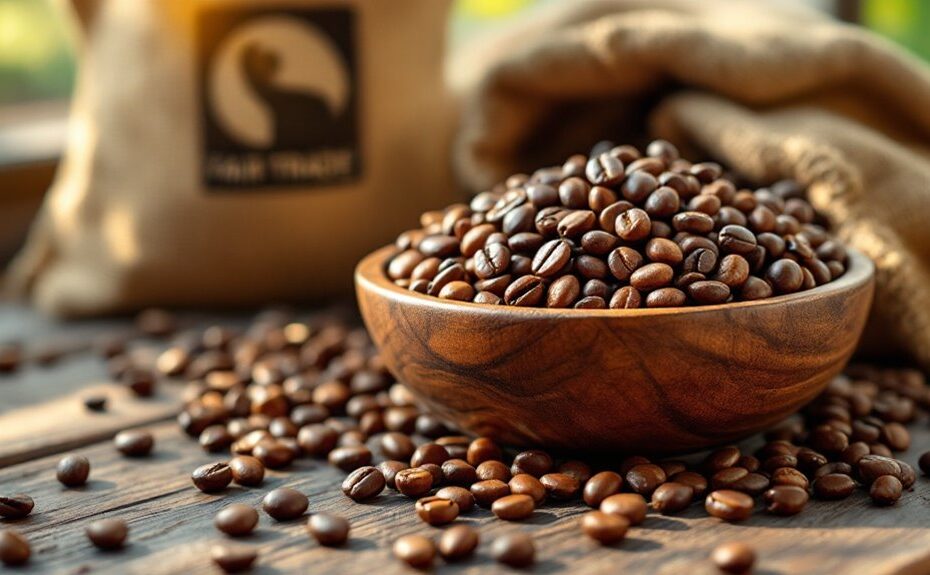



Imagine you're sipping a cup of Ethiopian Yirgacheffe, its floral notes and citrus undertones perfectly balanced—but what makes it truly special is knowing it's Fair Trade, sourced from farmers paid fairly for their labor. You might wonder, though, how to identify the best Fair Trade coffee beans when so many options claim ethical practices. Is it the origin, the certifications, or the roasting process that sets them apart? The answer lies in understanding what makes these beans stand out, not just in flavor but in their impact on communities and the planet. What should you look for to guarantee your coffee is truly making a difference?
Key Takeaways
- Look for Fair Trade Certified™ or Fairtrade Mark labels to ensure fair wages, safe conditions, and sustainable farming practices.
- Prioritize USDA Organic or Rainforest Alliance certifications for eco-friendly, pesticide-free coffee beans.
- Choose brands like Cafédirect, Equal Exchange, or Higher Ground Roasters known for ethical sourcing and community reinvestment.
- Explore origins like Ethiopia, Colombia, or Guatemala for vibrant, complex flavor profiles from Fair Trade-certified farms.
- Verify direct trade relationships or B Corp certifications for transparent, fair compensation to farmers.
What Makes Fair Trade Coffee Unique
Fair Trade coffee stands out because it guarantees farmers a minimum price for their beans, shielding them from unpredictable market swings. This stability allows farmers to invest in their crops and communities without fear of financial ruin. Beyond pricing, Fair Trade certification secures sustainable farming practices, reducing environmental harm and preserving biodiversity. You'll also find that Fair Trade premiums fund essential community projects, like schools, healthcare, and clean water systems, directly improving farmers' lives. The standards prohibit child labor and enforce safe working conditions, prioritizing ethical treatment. Additionally, Fair Trade coffee fosters direct, long-term relationships between farmers and buyers, securing transparency and equity in trade. By choosing Fair Trade coffee, you're supporting a system that values quality, sustainability, and fairness at every step.
Top Fair Trade Coffee Brands to Try
You'll find Cafédirect leading the way with ethical sourcing practices, reinvesting millions into growers and supporting nonprofit initiatives like Producers Direct. Equal Exchange stands out as a worker-owned co-op, ensuring USDA organic and Fair Trade standards while empowering farmers and consumers alike. For sustainable roasting methods, DOMA combines eco-friendly practices with partnerships that promote fair wages and community-driven farming.
Ethical Sourcing Practices
When exploring ethical sourcing practices in coffee, it's vital to evaluate brands that prioritize transparency, sustainability, and fair compensation for farmers. Fair Trade certified brands like Cafédirect reinvest millions into growers, guaranteeing long-term partnerships and ethical practices. Equal Exchange, a worker-owned co-op, empowers farmers through honest trade relationships, while Higher Ground Roasters sources 100% organic and Fair Trade beans, offsetting carbon emissions with wind power credits. Grumpy Mule emphasizes sustainability, offering USDA organic and Fair Trade certified coffee. BLK + Bold supports youth initiatives by donating profits and sourcing Fair Trade beans from Honduras and Ethiopia. These brands demonstrate how Fair Trade certification secures fair wages, environmental stewardship, and community development, making them leaders in ethical coffee sourcing.
Sustainable Roasting Methods
As you explore sustainable roasting methods among top Fair Trade coffee brands, you'll find that many prioritize eco-friendly practices to minimize environmental impact. DOMA Coffee Roasters, for instance, uses advanced coffee roasting technology that conserves 80% natural gas compared to traditional methods. Larry's Coffee integrates biofuels and rainwater systems into their roasting process while exploring renewable energy and sustainable packaging. Higher Ground Roasters offsets their carbon footprint by purchasing wind power credits, ensuring their coffee roasting aligns with green energy goals. Conscious Coffees, a Certified B Corporation, emphasizes sustainable sourcing and roasting, supporting small farms globally. Grumpy Mule focuses on long-term sustainability, ensuring ethical practices from farm to cup. These brands demonstrate how innovative coffee roasting can reduce environmental harm while delivering exceptional quality.
Benefits of Choosing Fair Trade Coffee
By choosing Fair Trade coffee, you directly support a system that guarantees farmers a minimum price for their beans, shielding them from unpredictable market swings. This secures they earn fair wages and maintain economic stability, even during volatile times. Fair Trade also promotes environmentally sustainable farming practices, reducing harmful chemical use and protecting ecosystems for future generations. Additionally, your purchase contributes to Community Development Funds, empowering farming communities to invest in self-directed projects like schools, healthcare, and clean water. Since 1998, Fair Trade has delivered over $1 billion in financial benefits to farmers, workers, and fishers, fostering long-term growth and resilience. By opting for Fair Trade coffee, you're not just enjoying a quality brew—you're making a tangible difference in the lives of those who grow it.
How Fair Trade Supports Farmers and Communities
Fair Trade guarantees farmers earn fair wages, shielding them from volatile market prices and fostering financial security. By promoting sustainable farming practices, it minimizes environmental impact and strengthens agricultural resilience for future generations. Additionally, Fair Trade Community Development Funds empower communities to invest in critical projects like education, healthcare, and infrastructure, driving long-term growth and self-sufficiency.
Fair Wages for Farmers
When you choose Fair Trade coffee, you're directly contributing to a system that guarantees farmers receive fair wages, shielding them from the volatility of global market prices. Fair Trade secures a minimum price for coffee beans, providing financial stability for farmers and workers. This system has delivered over $1 billion in cumulative benefits since 1998, empowering communities to thrive. Fair labor conditions are a cornerstone of Fair Trade certification, safeguarding safe working environments and equitable pay. Additionally, premiums from Fair Trade sales fund community projects like schools, healthcare, and clean water, chosen by the farmers themselves. By supporting Fair Trade, you help create a sustainable future for coffee-growing communities, guaranteeing farmers and workers can invest in their livelihoods and improve their quality of life.
Sustainable Farming Practices
Sustainable farming practices are at the heart of Fair Trade's mission to support farmers and their communities. When you choose Fair Trade coffee, you're supporting organic and Fair Trade methods that prioritize environmental health. Farmers avoid harmful pesticides and adopt eco-friendly techniques, reducing their ecological footprint. These practices not only protect the land but also guarantee the long-term viability of coffee farming. Fair Trade certification encourages crop diversification, soil conservation, and water management, which enhance resilience against climate change. By promoting organic farming, Fair Trade helps farmers produce high-quality beans while safeguarding biodiversity. You're contributing to a system that values sustainability, securing farmers can continue to thrive without compromising the environment. This commitment to sustainable practices benefits both the planet and the people who depend on it.
Community Development Projects
By choosing Fair Trade coffee, you're directly contributing to community development projects that empower farmers and their families. Fair Trade allocates $0.20 per pound of coffee to Community Development Funds, enabling farming communities to invest in schools, healthcare, and clean water initiatives. These self-directed projects foster long-term resilience and improve quality of life. Since 1998, over $1 billion in cumulative benefits has been delivered to farmers, workers, and fishers through Fair Trade Certified programs. The Fair Trade minimum price protects farmers from market volatility, ensuring they can reinvest in sustainable practices and infrastructure. During Fair Trade Month in October, the impact of ethical purchasing is highlighted, showcasing how your choices support projects chosen by producer communities. Your purchase drives meaningful change, creating a ripple effect of empowerment and sustainability.
Environmental Impact of Fair Trade Coffee
Fair Trade coffee substantially reduces environmental harm by promoting sustainable farming practices that minimize the use of harmful pesticides and fertilizers. When you choose Fair Trade certified coffee, you support farms that adhere to strict environmental standards, such as protecting water sources and conserving biodiversity. Many Fair Trade farmers use shade-grown methods, which preserve forest habitats and support wildlife. Additionally, Fair Trade premiums fund community projects like reforestation and soil conservation, enhancing environmental resilience. By encouraging organic farming, Fair Trade coffee reduces carbon footprints and promotes healthier ecosystems. You're not just buying a cup of coffee; you're contributing to a system that prioritizes the planet's health. This commitment to sustainability guarantees that your coffee choice has a positive environmental impact.
Key Certifications to Look For
When selecting coffee, it's vital to seek out certifications that align with ethical and sustainable values, as they guarantee transparency and accountability in the supply chain. Look for the Fair Trade Certified™ label, which secures farmers receive a minimum price for their beans, shielding them from market volatility. The Fairtrade Mark also guarantees fair wages, safe working conditions, and sustainable farming practices. For environmentally conscious choices, USDA Organic certification confirms coffee is grown without synthetic pesticides or fertilizers. Rainforest Alliance certification supports biodiversity and sustainable livelihoods. Additionally, Direct Trade certifications highlight transparent, long-term relationships between roasters and farmers, often resulting in higher quality beans. Prioritizing these certifications guarantees your coffee supports ethical practices and environmental stewardship.
Popular Fair Trade Coffee Origins
As you explore the world of Fair Trade coffee, you'll find that certain origins stand out for their exceptional quality and distinctive flavor profiles. Ethiopia, the birthplace of Arabica, delivers Fair Trade beans with vibrant fruity and floral notes. Colombia offers balanced Fair Trade coffee, featuring medium body and hints of caramel, citrus, and nuts. Guatemala, particularly the Huehuetenango region, produces Fair Trade coffee with complex layers of chocolate, cherry, and spice. Peru is a leading Fair Trade origin, known for its organic beans with bright acidity and flavors of nuts, cocoa, and citrus. Honduras has also risen as a key Fair Trade producer, offering beans with sweet, fruity, and chocolatey profiles. Each origin reflects the dedication of Fair Trade farmers to quality and sustainability.
Brewing Tips for Fair Trade Coffee
To access the full potential of Fair Trade coffee, mastering brewing techniques that highlight its unique flavors and aromas is essential. Start by using a medium grind for drip coffee makers to guarantee ideal extraction and flavor. Brew Fair Trade coffee at a water temperature between 195°F and 205°F to avoid bitterness or under-extraction. For French press methods, steep the grounds for 4 minutes to achieve a rich, full-bodied cup. When using pour-over methods, experiment with a 1:15 coffee-to-water ratio (e.g., 20g coffee to 300ml water) for balanced flavor. Always store Fair Trade coffee beans in an airtight container away from light and heat to preserve their freshness and aroma. These steps guarantee you savor the quality and ethical essence of Fair Trade coffee.
How to Identify Ethical Coffee Brands
Identifying ethical coffee brands requires a keen eye for certifications and a commitment to understanding their sourcing practices. Start by looking for the Fairtrade Mark, which guarantees adherence to high environmental, economic, and social standards, securing fair wages and sustainable farming. Check for additional certifications like USDA Organic or B Corp, which signal ethical production and transparency. Research brands that establish direct trade relationships with farmers, as this often secures fair compensation and fosters long-term partnerships. Verify if the brand reinvests profits into community development or supports nonprofits focused on social impact. Finally, prioritize companies that use eco-friendly packaging and sustainable methods, such as shade-grown or organic coffee. These steps help you support Fair Trade practices while enjoying high-quality, ethically sourced coffee.
Disclosure: As an Amazon Associate, I earn from qualifying purchases.






